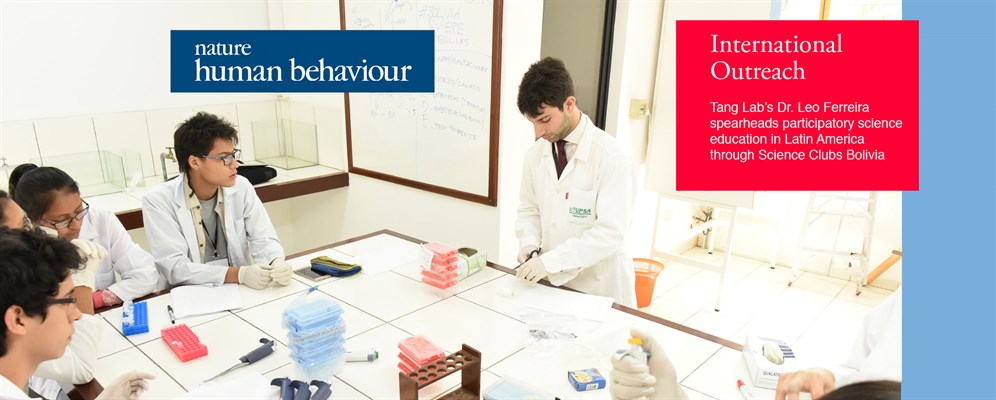Tang Lab's Dr. Leonardo Ferreira Spearheads Participatory Science Education in Latin America

Leonardo M.R. Ferreira, Ph.D., @enhancerleo, postdoctoral scholar in the laboratories of Dr. Qizhi Tang (Department of Surgery) and Dr. Jeffrey Bluestone (Diabetes Center) at UCSF, is changing the way science is taught in Latin America.
Accounting for over 10% of the world’s population, Latin America nevertheless contributes less than 5% of the world’s scientific publications. In the United States, Latino students are underrepresented in scientific careers. Bolivia is a diverse country with one of the lowest rates of production of scientific knowledge in Latin America.
Science Clubs Bolivia (“Clubes de Ciencia Bolivia”) is an initiative spearheaded by at the time graduate students at Harvard University, including Dr. Ferreira, in 2015. Every year, it brings graduate students and postdoctoral fellows from premier research institutions, including Harvard, MIT, UCSF, Stanford, and Johns Hopkins, to Bolivia to teach science to high school and college students through weeklong intensive courses featuring interactive lectures and laboratory experiments (“clubes”). Course topics range from immunology and genome engineering to neuroscience, featuring experiments using CRISPR/Cas9 genome editing, microscopy, and cyborg insects.
The first article reporting on the impact of this initiative, titled "Effective participatory science education in a diverse Latin American population", has now been published in Palgrave Communications, a NatureResearch journal. The authors report that students increased their interest in science and performed better in subject tests after their courses than students who took college-level courses in Bolivian universities on the same subjects. These data suggest that such low cost and scalable approach can be applied to improve science education in developing nations and underrepresented communities.
In addition to Dr. Ferreira, first author of the study, the co-founder and executive director of Clubes de Ciencia Bolivia, Dr. Mohammed Mostajo-Radji, @mohammedmostajo, is also a postdoctoral scholar at UCSF, in the laboratory of Dr. Alex Pollen (Broad Institute of Regenerative Medicine and Stem Cell Research).
In a second article, published August 19 in Nature Human Behaviour, titled "Scientists as non-state actors of public diplomacy" the authors further advance the notion that scientists can mediate public diplomacy between developed countries and developing nations using science education.

Using Dr. Ferreira’s words, “When a whole part of the world is not involved in science, it's not just them who lose, but the whole world, as one doesn't know where the next breakthrough in biology and medicine will come from”.
Our article on #scientists as #nonstate #public #diplomats @NatHumBehav featured in today's @Nature highlights for #scientific #community and #society!!!@CdeCBo @gcarosso @mohammedmostajo https://t.co/TzQLgmz5Ibhttps://t.co/WL0o8qL5aq pic.twitter.com/QYBwwf38Jk
— Leonardo Ferreira (@enhancerleo) August 19, 2019
Opportunities for UCSF Grad Students and Post-docs
Interested graduate students and postdoctoral researchers at UCSF are invited to participate in this Science Outreach Program. Applications are open twice a year to participate in the multiple countries where the program operates.
For more information, please email contact@scienceclubsint.org or Rogelio.Hernandez-Lopez@ucsf.edu
Dr. Rogelio Hernandez-Lopez, is a postdoctoral fellow at UCSF and member of the Wendell Lim Lab in the Department of Molecular and Cellular Pharmacology, and is a co-founder of Clubes de Ciencia Mexico and Science Clubs International, the umbrella organization for all the countries that utilize the Clubes de Ciencia model.